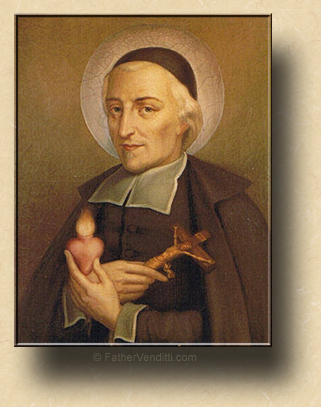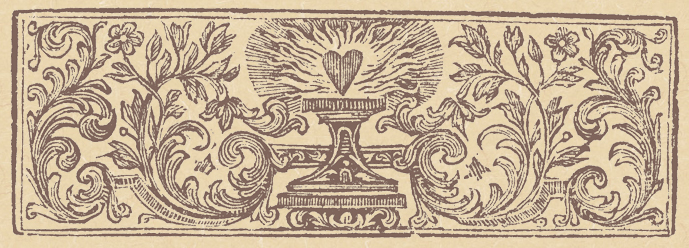All for the Hearts of Jesus & Mary.
The Twentieth Wednesday of Ordinary Time; or, the Memorial of Saint John Eudes, Priest.
Lessons from the primary feria, according to the ordinary form of the Roman Rite:
• Judges 9: 6-15.
• Psalm 21: 2-7.
• Matthew 20: 1-16.
The Third Class Feast of Saint John Eudes, Confessor.
Lessons from the common, according to the extraordinary form of the Roman Rite:
• Ecclesiasticus 31: 8-11.
• Psalm 91: 13-14, 3.
• Luke 12: 35-40.
The Twelfth Wednesday after Pentecost; a Postfestive Day of the Dormition; and, the Feast of the Holy Martyr Andrew the Tribune & His Companions.
Lessons from the pentecostarion, according to the Ruthenian recension of the Byzantine Rite:
• II Conrinthians 9: 12—10: 7.
• Mark 3: 20-27.
FatherVenditti.com
|
 8:54 AM 8/19/2015 — I'm feeling very lazy today, so I'm going to talk to you about today's saint, John Eudes, but not in my own words. 8:54 AM 8/19/2015 — I'm feeling very lazy today, so I'm going to talk to you about today's saint, John Eudes, but not in my own words.
We've heard his name before in this chapel: we mentioned him in passing both on the Feast of the Sacred Heart of Jesus and on the Memorial of the Immaculate Heart of Mary. I've also mentioned to you, in in the context of talking to you about other saints, that the traditional Roman Breviary, which I use for my daily celebration of the Divine Office, often commemorates the saints by making the third lesson for Matins a very interesting and detailed biography of the saint; so, I would like to make my homily today the reading of that lesson for the feast of St. John Eudes, in what I hope is an understandable translation:
John was born in 1601 of good, devout parents at the village of Ri in the diocese of Seez. While yet a boy, when he was refreshed with the Bread of Angels, [that is, when he received his First Holy Communion] he vowed perpetual virginity. In the schools, where he pursued his studies in a praiseworthy way, he shone for his wonderful piety. He loved the Blessed Virgin above all, and burned with great charity for his neighbor. Having joined the Berullian Congregation of the Oratory, he was ordained priest at Paris. He was made rector of the house of the Oratory at Caen, but left it, although sadly, to educate suitable young men for the ministry of the Church. To this end, with five companions, he founded the congregation of priests to which he gave the most holy Names of Jesus and Mary, and opened the first seminary at Caen, which was followed later by many others. In order to call sinful women back to a Christian life, he founded the Order of Our Lady of Charity. Of this noble tree, the Congregation of the Good Shepherd of Angers is a branch. [Angers is the name of a town.] He also founded the Society of the Admirable Heart of the Mother of God and other charitable institutions. Burning with a singular love for the most sacred Hearts of Jesus and Mary, he was the first to think—not without some inspiration from God—of offering them a liturgical cult. As an Apostolic Missionary, he preached the Gospel to many villages and towns. Worn out with his great labors, he died peacefully on the 19th of August, 1680. Famous for many miracles, he was numbered among the Blessed by Pope Pius X, and among the Saints by Pope Pius XI on the day of Pentecost in the holy year, and his Office and Mass were extended to the universal Church.
Now, here at the Shrine we're always praying for the triumph of Mary's Immaculate Heart, but we don't often ask for the intercession of St. John Eudes in that quest. His Congregation of the Hearts of Jesus and Mary is present here in this country, but not as extensively as in his native France, where they are known simply as the Eudist Fathers. When I was two years ordained, I made pilgrimage with four other priests to a variety of Holy places in France, and we had the privilege of staying in the Eudist Fathers' house of studies in Paris, which is where I became acquainted with this saint. So, as we continue to pray for the triumph of Mary's Immaculate Heart, I would like simply to recommend that we invoke often the intercession of this great saint.
I would also like to suggest that his life, in which he moved from place to place, first in this group and then in that, is a testimony to what we've talked about many times here in this chapel about letting the Lord lead us where he wants us to go, even though it turns out not to be what we had in mind for ourselves.

|

